Have you ever considered swapping bricks and mortar for life on a houseboat? Urban designer Peter Kelly did just that and has been living on a houseboat for the past couple of years. Has it made him happier? And what are the ups and downs to a life on the UK's waterways?
It’s mid-week, May 2020, and I’m sat shirtless on a grass bank discussing parasitic wasps with a neighbour I recently met. We’re admiring another visitor to our sunbathing spot: a skinny, acid-yellow wasp. Some Googling reveals that it’s preying on the larvae of the friendlier-looking bees which had so enamored us the week before.
The bank we’re sitting on hasn’t been maintained this year as the marina, where we are both moored, has largely shut down. The bank is alive with wild flowers which have, in turn, attracted a bumper generation of insects. Both of us discuss the beautifully quiet skies which would usually be full of planes going to and from Stansted Airport. Today there is nothing in the sky but birds. Welcome to my world of houseboat living.
But my life wasn’t always like this. Living on a houseboat is a relatively recent life change for me. So, how did I get here? Well, just two years ago I took the leap from land onto water as a frustrated reaction to the over-inflated housing costs in London – the city in which I have tried to make my home.
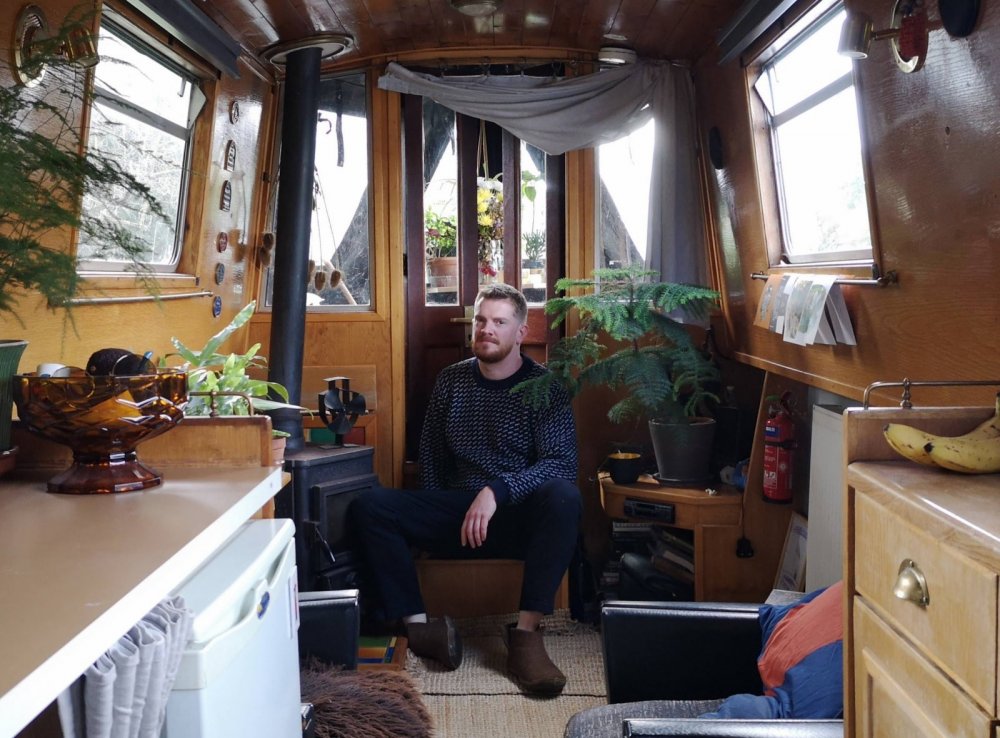
All aboard: Peter inside his houseboat
And, after some painful experiences with incompatible housemates, I needed my own space. Back then I’d also diagnosed myself with Nature Deficit Disorder. I was falling out of love with the city and my daydreams were filled with nature and an aching need to be closer to it. Apparently, disconnection from nature is a significant cause of urban stress.
Indeed, research shows that spending time somewhere natural can significantly improve well-being. This is more fundamental that having a takeaway sandwich lunch in a busy park: it’s about spending time meaningfully connecting with ourselves as part of nature, something which is very difficult for the average big city dweller to do.
RELATED:
- Why Reconnecting With Nature Is Essential For Us
- The 6 Science-Backed Benefits of Living Simply
- Gazing at the Stars: Replacing Worries With Wonder
So, here I am now writing this. Two years later I’m tied up next to a path of mud and puddles in Hertfordshire. And instead of being huddled in the city for warmth, close to my friends, I’m out in the countryside, exactly when nature has gone to sleep (with a fire keeping me cosy!).
Over the past few weeks I’ve taken the commuter train into London for work, missing the lovely canalside bike journey I would take if I was moored closer to town. In fact, the nicest part of my job for the last two years has been the cycle to and from it, something houseboat living has enabled me to do.
I get to see the sun rising over the misty water, flocks of water birds shrieking with delight at the start of a new day, and I barely see a car until I get into the middle of Hackney. If I was still living in a flat in the city, my journey would have been more far less attractive alternative from the top of a bus or Tube. 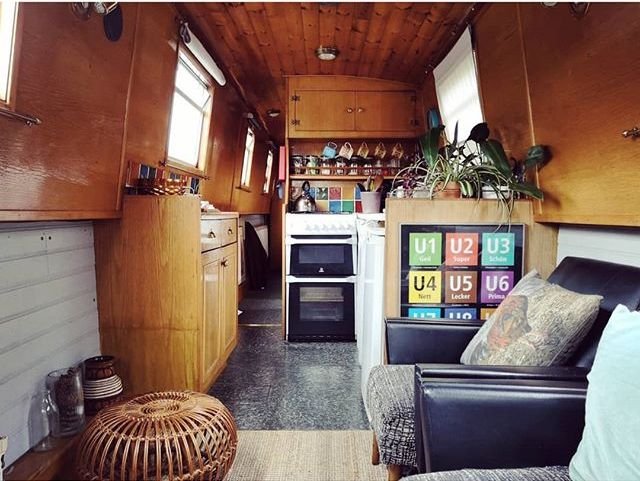
Inside the houseboat: small but beautifully formed
I’m hanging onto my job because it’s the gateway to a mortgage, and with my low monthly outgoings I’m trying to save up a deposit. Indeed, while I love living my houseboat life, I’d still like to get on the property ladder eventually. Meanwhile, the relatively low cost of living on a houseboat is helping me to achieve my aim.
As a so-called 'continuous cruiser' here in the UK I have to do at least 20 miles, in a line, without too many large jumps, with moves every two weeks. This allows me to get by with a yearly £900 England and Wales River and Canal licence as my main housing expense. That’s around the monthly cost for a room or houseshare in many central parts of London.
Houseboat living: the beginning
My discovery of houseboat living is an interesting one. Sometime in Autumn the year before, as my relationship with my flatmate was turning sour and the flat in which I had a small stake had been put up for sale, I started chatting online with a boater. He was moored outside, and the flatmate was out, giving me a rare moment of peace and quiet.
I felt pretty sorry for the boater outside living in his cold and damp home below the waterline. I imagined a copper kettle warming up on a stove to fill a water bottle. My flatmate and I had just completed the renovation of our flat and I was feeling proud of the new bathroom. So, in an act of kindness, I invited the boater up for a shower. He returned the favour by inviting me to a party he was hosting that night.
His boat was a ‘half wide-beam’ which means it’s a little wider than the standard narrowboat – and big enough that you don’t have to walk sideways! Well, to say my mind was blown was a bit of an understatement. The boat was tastefully fitted out with mid-century furniture and, of course, his shower was nicer than my recently-installed one!
“In many ways, living on a houseboat is a second job. It takes a lot of time to do all the things which are easy on land, such as washing clothes, disposing of rubbish and recycling.”
One lovely party with adorable boaty and non-boaty people later I returned to my own home with a new appreciation of the canal community which I had often literally looked down on from my balcony but never really ‘seen’. Oddly, this summer I met a person I’d once spotted pedalling his engine-less boat along the canal a couple of years before. Back then I think I saw a curious social outcast living on the fringes of society, but now I realise that he and many other people in the houseboat crew might be onto something.
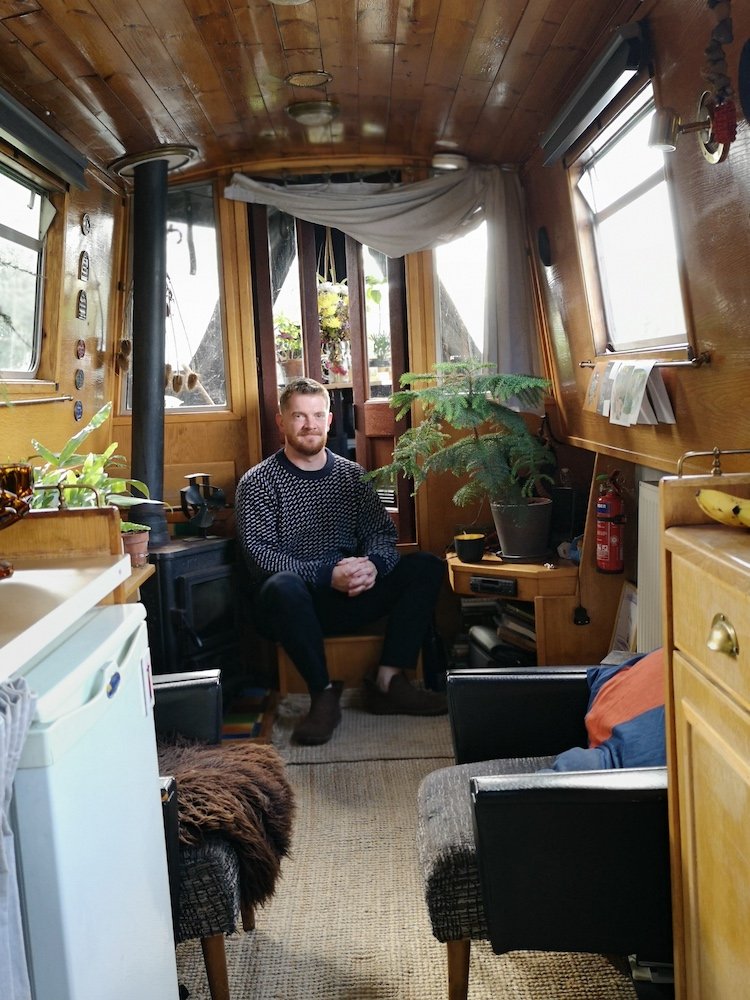
Peter found happiness in houseboat life
In fact, they’ve joined this long, linear community which threads through much of Great Britain, having taken a side step away from polite society. In many ways they now live a life of freedom, exploration and adventure – just parallel to everyone else. Who says that Henry Thoreau-like log cabin we have all fantasized about living in actually needs to be tethered to the land?
Lifeboat life: hidden costs
So, back on the sunny, grass bank, my new friend and I chat while we sunbathe during a long home-working lunch break (I’m now lucky enough to be able to work remotely). He’s cooked an amazing lunch for us both and I’ve provided a bottle of wine.
I’m moored in this location because soon after I moved on from the muddy tow path I stopped in a marina to have a niggling engine problem looked at. Well, it turns out my engine is older than the 1990s hull and probably once lived inside a taxi. These old diesel engines on houseboats are supposed to go on for ever! Mine, however, turns out to be on its very last blue smokey splutter. My quick visit to the marina on my way back to London turned into six months as my engine was removed by crane and replaced at eye-watering cost. My savings from the year? Completely. Wiped. Out.
That’s another thing about life on a houseboat. You think it will be cheap. Water is included in the cost of the licence and electricity is free. Solar panels on the roof charge batteries which can be enough to run a fridge, although many boaters also use generators.
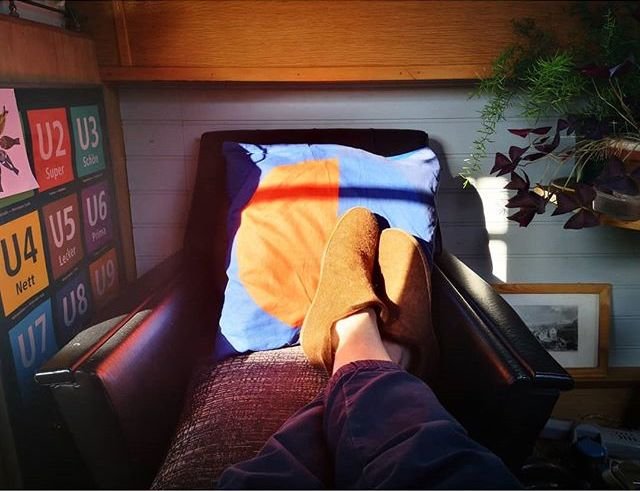
Keeping cozy: space to put your feet up!
Bottled propane lasts about half a year and is cheaper than mains gas. But there are a lot of occasional and unexpected costs. Every few years the boat has to come out of the water for the hull to be blacked. Things also go wrong, so after a few affordable months you can be hit with unexpected costs. Oh, and of course there is the cost of the boat itself which, for me, was the cost of around three years of London rent.
Also, in many ways, living on a houseboat is a second job. It takes a lot of time to do all the things which are easy on land, such as washing clothes, disposing of rubbish and recycling. It’s also difficult to maintain that socially acceptable ironed and smart veneer that’s essential for working in town. In fact, I gave up trying to iron my shirts and now just spray them with water and shake them the night before!
Secret stresses
I’m not the first person to think that houseboat living might be preferable to living in a flat. And, to be honest, the canals around London are crowded. In fact, there are more boats on the canal today than at any point in history. In central London that crowding can be stressful. Boats can be moored three deep. So, your dream of a peaceful and low-cost life is a fiction as countless other dissatisfied city-dwellers take vessels of varying levels of habitability and crowd into the areas they wish they could afford a home in.
However, for me, this unexpected past year of being stuck in the countryside has been one of the best of my life. The two weeks I spent cooped up with suspected Coronavirus aside, I have reconnected with nature in a way which feels real.
“My Nature Deficit Disorder is in remission and my increasingly lonely urban life has been filled with some wonderful aquatic souls thanks to living on a houseboat.”
For the first time in 15 years living in and around London I have seen and felt the seasons change. I’ve watched with actual joy as spring unfurled her greenery and now feel autumn arriving with much needed rain and cooler temperatures.
The second duvet I packed away only a few months ago is back out and I’m starting to think about getting some logs in for the fire. It will no doubt be burning a lot of wood over what will feel like a very long winter, working from home away from my daily hot shower at work. However, research does suggest that a daily cold shower can improve your physical and mental health by reducing inflammation (although who showers every day when you don’t have to be presentable for other people?).
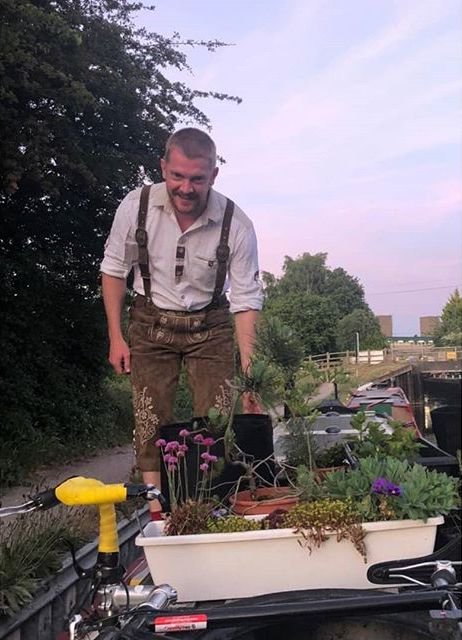
Raising the roof: Peter's garden above
As popular topics of conversation amongst boaters, toilet issues battle for top place with phone signal. Either it can’t pass the waters edge or the metal of the boat reflects it away, but we all spend countless hours with phones pressed to the window hoping for enough reception to download an email.
Being freed from my phone and the time-wasting lure of social media is another thing I’ve wished for, but it’s strange and frustrating how it’s come true. It’s almost as if my new life is trying to help me leave the job I don’t actually want to be doing, by making it frustratingly impossible to do.
Feeling happiness
As I type this, my hands are getting cold. By mid-winter I’ll be wearing a hat in bed again and, if the fire has gone out during the night, it will be almost as cold inside as it is out. I’ve heard that central heating is bad for our immune systems and that a yearly dose of cold is something our bodies benefit from. Still, I’d kill for the click of a thermostat right now and that comforting sound of radiators glugging into life!
Like many of us, my plan for the year has been blown out of the water. However, I’m actually extremely grateful for where it’s landed me, and despite the ongoing absence of land-based comforts, I’m generally very comfortable.
My Nature Deficit Disorder is in remission and my increasingly lonely urban life has been filled with some wonderful aquatic souls thanks to living on a houseboat. My mind continues to wander off towards the increasingly distant dream of a flat of my own. Sometimes, though, I stand in the cosy wooden interior of my boat and realise I feel completely at home. In those moments I can actually feel quite... happy. •
happiness.com | The fine art of being: learn, practise, share
Are you a happiness.com member yet? Sign up for free now to enjoy these benefits:
■ our happiness magazine with practical life tips and inspiration
■ share knowledge and help support others in our happiness forum
■ learn and self-develop with free online classes in our happiness Academy
Written by Peter Kelly
 Peter has worked as an urban designer for 15 years. He is interested in how the urban and natural environment can improve our well-being and quality of life. He loves to share insights into beautiful, happy places and encourage people to follow their instincts towards a more fulfilled life.
Peter has worked as an urban designer for 15 years. He is interested in how the urban and natural environment can improve our well-being and quality of life. He loves to share insights into beautiful, happy places and encourage people to follow their instincts towards a more fulfilled life.


Join the conversation
You are posting as a guest. If you have an account, sign in now to post with your account.